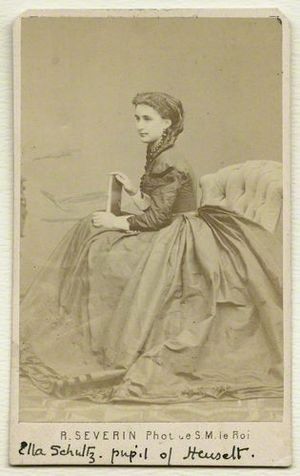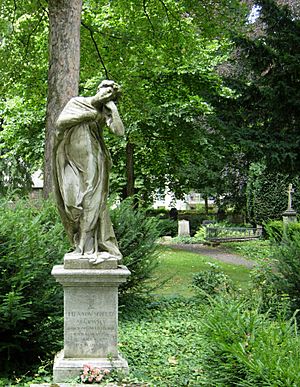Ella Adayevskaya facts for kids
Ella Georgiyevna Adayevskaya (born February 22, 1846 – died July 26, 1926) was a talented Russian-German musician. She was a composer, a pianist, and an ethnomusicologist. An ethnomusicologist studies music from different cultures and how it connects to people's lives.
Adayevskaya wrote many kinds of music. This included songs for voices, music for small groups of instruments, and two operas. She also collected Italian songs and wrote about folk music and the music of ancient Greece.
Contents
Early Life and Music Studies
Ella Adayevskaya was born in St. Petersburg, Russia, on February 22, 1846. Her birth name was Elizaveta von Schultz. Her father, Georg Julius von Schultz, was a well-known scholar.
Ella started playing the piano when she was a child. She had famous teachers like Adolf von Henselt and Anton Rubinstein. She also studied how to compose music with Alexander Famintsyn and Nikolai Zaremba.
Her stage name, Adayevskaya, was a special choice. It came from the musical notes A, D, and A. These notes are played by the kettledrum in an opera called Ruslan and Ludmila by Mikhail Glinka.
Composing and Traveling
Adayevskaya wrote music for the Russian Imperial Chapel Choir early in her career. In the 1870s, she created two operas. Her first opera, Neprigozhaya (The Ugly Girl), was written in 1873.
Her second opera, Zarya (Dawn), was finished in 1877. This opera was dedicated to Tsar Alexander II. However, it was not allowed to be performed by the officials at the time.
Later, Adayevskaya traveled around Europe. She performed many solo concerts. In 1882, she decided to live in Venice, Italy. While in Italy, she collected many folk songs from different regions. She was especially interested in songs that used a special rhythm called quintuple metre.
In 1881, she composed her Greek Sonata. This piece was for a clarinet or a violin and a piano.
Later Years and Legacy
In 1911, Adayevskaya moved to Neuwied, Germany. There, she became friends with the poet Carmen Sylva. She continued to write many articles about folk music, sharing her knowledge with others.
Ella Adayevskaya passed away in Bonn, Germany, in 1926. She was buried in the Alter Friedhof cemetery in Bonn. Her work helped people understand more about folk music and the music of ancient times.
Main Works
Operas
- Neprigozhaya (The Ugly Girl), 1873
- Zarya svobody (The Dawn of Freedom), 1877
Vocal Music
- Yolka (The Fir Tree), a cantata (a type of vocal music), around 1870
- Other choral works and songs
Chamber Music
- Greek Sonata for clarinet and piano, 1881
- Various piano pieces
 | Frances Mary Albrier |
 | Whitney Young |
 | Muhammad Ali |



